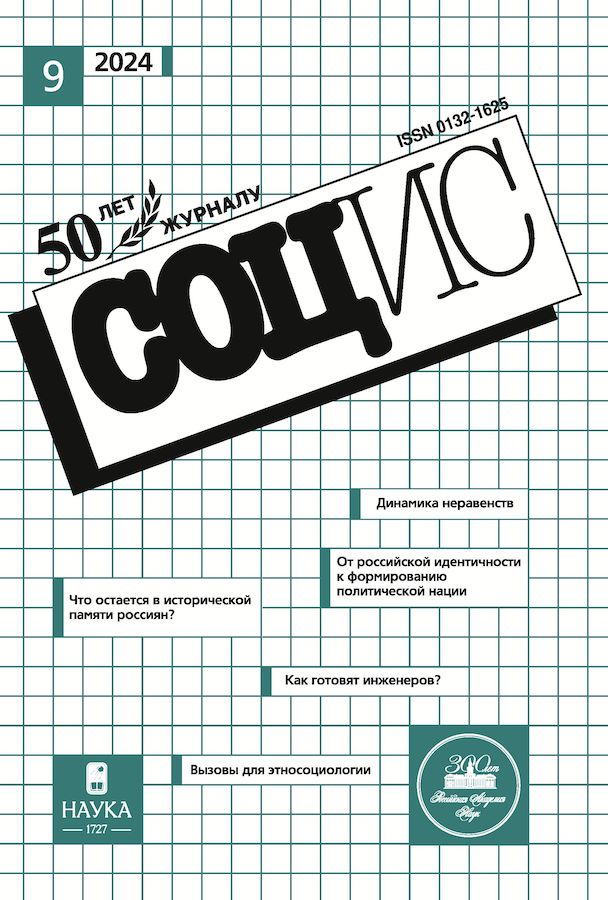The Results of the “5-100 Project”: Projection on the Employment of Graduates
- 作者: Tiourina I.O.1, Kliucharev G.A.1,2
-
隶属关系:
- Institute of Sociology of FCTAS RAS
- NRU “Moscow Power Engineering Institute”
- 期: 编号 9 (2024)
- 页面: 80-88
- 栏目: SOCIOLOGY OF EDUCATION
- URL: https://clinpractice.ru/0132-1625/article/view/661934
- DOI: https://doi.org/10.31857/S0132162524090079
- ID: 661934
如何引用文章
详细
The issue of graduate employment is considered as a function of systemic transformations of higher education caused by large-scale public investments. The article analyzes the results of the 5-100 project (2013–2020), the purpose of which was to adapt Russian universities to world standards and include them in the international educational environment. Upon its completion, a significant reformatting of curricula and standards was achieved, a transition to a new organization of the educational process was carried out, which together had an impact on more successful employment of graduates of leading universities. The article presents the results of a comparative analysis of the graduates employment of leading universities (n = 18) and other universities (n = 185) that took part in the study of the Institute of Sociology of the Federal Research Center of the Russian Academy of Sciences in October-December 2021. Sample structure: employed graduates (N = 3788) of these universities, including (N = 368) graduates of universities participating in the 5-100 project. Also interviewed were 203 experts – vice-rectors and heads of university employment services, of which 18 people represented leading universities. The sampling model was formed by statistical quotas, proportional to the number of graduates in the federal districts of the Russian Federation. The surveyed young specialists had no more than 1–5 years of work experience since graduation. Thus, all of them were trained during the period of the “5-100” project. One of the main conclusions in the study was the recognition that training at “5-100” group universities provided graduates with well-paid work in their specialty and a high degree of personal satisfaction with their work.
全文:
作者简介
Irina Tiourina
Institute of Sociology of FCTAS RAS
编辑信件的主要联系方式.
Email: irina1-tiourina@yandex.ru
Candidate of Sociological Sciences, Leading Researcher
俄罗斯联邦, MoscowGrigory Kliucharev
Institute of Sociology of FCTAS RAS; NRU “Moscow Power Engineering Institute”
Email: kliucharev@mail.ru
Dr. Sci. (Philos.), Head of the Center for the Sociology of Education and Science; Professor of the Department of Philosophy, Sociology and Law
俄罗斯联邦, Moscow参考
- Agasisti, T., Shibanova, E. et al. (2020) The Russian Excellence Initiative for Higher Education: А Nonparametric Evaluation of Short-Term Results. International Transactions in Operational Research. No. 4: 1911–1929.
- Bulatova G. A. (2020) Employment of graduates of higher educational institutions: an analytical review of statistical data and research materials. Ekonomika. Professiya. Biznes [Economy. Profession. Business]. No. 3: 14–29. doi: 10.14258/epb201981. (In Russ.)
- Cherednichenko G. A. (2020) Graduates of Russian universities in the labor market (Rosstat survey data). Sociologicheskaya nauka i socialnaya praktika [Sociological science and social practice]. No. 3: 108– 124. (In Russ.)
- Cherednichenko G. A. (2020) Who is expected in the labor market and are universities ready for this. Rektor vuza [Rector of the university]. No. 1: 20–31. (In Russ.)
- Egorov A. A. (2020) Evaluation of the effectiveness of universities based on their production functions. Universitetskoe upravlenie: praktika i analiz [University management: practice and analysis]. No. 4: 87–99. (In Russ.)
- Gimpelson V. E., Zudina A. A., Kapelyushnikov R. I. (2020) Non-cognitive components of human capital: what do Russian data say. Voprosy ekonomiki [Questions of Economic]. No. 11: 5–31. (In Russ.)
- Kapelyushnikov R. I. (2021) Return on education in Russia: can’t get any lower? Voprosy ekonomiki [Questions of Economic]. No. 8: 37–68. (In Russ.)
- Kotchegura A, Martino de M., Farazmand A. (2022) Enhancing Competitiveness of the Russian Higher Education: The 5-100 University Excellence Program through the Lens of Efficiency and Performance. International Journal of Public Administration. No. 2: 185–107.
- Lisyutkin M., Farazmand A., Froumin I. (2022) Declining Public Universities: Patterns and Lessons for Public Policy and Administration. A Russian Case Study. International Journal of Public Administration. No. 2: 157–170.
- Osipyan A. (2020) Generation “0-100”: Russian universities cannot provide a world-class education. InoSmi. 2020. URL: https://inosmi.ru/20201030/248436738.html (accessed 10.02.2024). (In Russ.)
- Shatskaya I. V. (2017) Development of the state system of labor resources management at the present stage. Ekonomika truda [Labor Economics]. No. 3: 173–182. (In Russ.)
- Varshavskaya E. Ya. (2017) Where and as whom do highly educated Russians work. Demoskop Weekly [Demoscope Weekly]. No. 713–714. URL: http://demoscope.ru/weekly/2017/0713/tema01.php. (In Russ.)
- Varshavskaya E. Ya. (2019) Job search strategies of university graduates: prevalence and effectiveness. Sotsiologicheskie issledovaniya [Sociological studies]. No. 7: 56–66. (In Russ.)
补充文件









